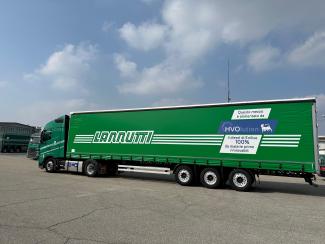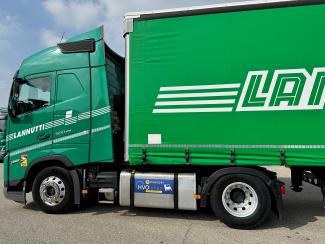AGC’s glass transport in Italy also shifting to HVO fuelled trucks thanks to partnership with Lannutti
Thanks to a strong partnership with Italian energy company ENI, our glass transport partner Lannutti is successfully shifting from standard fuel to ENI HVOlution, a diesel fuel produced from 100% renewable raw materials, for the Italian fleet operations. This helps AGC take another step in making the supply chain increasingly greener with HVO (Hydrotreated Vegetable Oil) fuels.
Last year, AGC announced the inauguration of the new and first 100% electric Volvo trucks for AGC glass transport by Lannutti, to start decarbonizing the fleet handling the glass transport between the AGC plant in Cuneo and the Lannutti storage areas near the site. Now, Lannutti will further green the transportation of glass by embarking on the journey of HVO fuels.
About HVO fuels
According to technical data from ENI, HVOlution is exclusively produced using biogenic raw materials (mainly waste and residues) such as used cooking oil or vegetable oil processing waste, and can also be made from oils produced from marginal land. This is not in competition with the food chain and is supplied through a network of agri-hubs that ENI is establishing in several African countries. The use of pure HVO enables a 60% to 90% reduction in CO2 emissions across the supply chain compared to the benchmark fossil blend, depending on the feedstock used.
Reducing carbon emissions of glass transport in Italy
The use by Lannutti of ENI HVOlution in the transportation of AGC glass in Italy will allow AGC to make a next step on our carbon roadmap for scope 3*. The CO2 emissions on trips executed for AGC during one year (limited to trips done with the new HVOlution fuel in the Italian market) are 4531 ton CO2/year (figures based on year 2022). The estimated CO2 emissions reductions per year compared to conventional diesel will amount to:
- 204 ton/year TTW (TTW = means from Tank to Wheel (CO2 emissions on the vehicle)
- 3661 ton/year WTW (WTW = means from Well to Wheel (CO2 emissions on the full cycle).
President Architectural Glass Europe & Americas at AGC, Davide Cappellino welcomes this new move towards sustainable transportation saying: “On our Carbon Roadmap towards our commitment to achieve carbon neutrality by 2050, we are leading the way and are very happy to make another important step of progress on reducing further AGC’s scope 3 emissions. We cherish the partnership with our historical logistic partner Lannutti that is as keen as we are to move forwards and towards eco-friendly logistics".
(*) Scope3: indirect emissions from upstream and downstream activities along our value chain.
More on AGC's commitment to sustainability and the latest news of our decarbonisation journey on https://www.agc-glass.eu/en/sustainability
Share this page
AGC Glass Europe
Niels Schreuder
Public Affairs & Communication
Mobile: +32 497 621 595
Niels.Schreuder@agc.com
AGC Glass Europe, a European leader in flat glass
AGC Glass Europe produces, processes and markets flat glass for the construction industry (external glazing and interior decoration), car manufacture and other industrial sectors (transport, solar power and high-tech). It is the European branch of AGC, a world leader in flat glass. It has over 100 sites throughout Europe and employs around 15,300 employees.
More information on www.agc-glass.eu (corporate site), www.agc-yourglass.com (glass for the construction industry) and www.agc-automotive.com (for the automotive industry).

